- Home
- Michelle Hodkin
The Evolution of Mara Dyer Page 5
The Evolution of Mara Dyer Read online
Page 5
Noah was quiet for a moment. Then said, “You think he took Joseph.”
It wasn’t a question, but I nodded in assent.
Noah’s voice was low but strong. “I won’t let him hurt your family either, Mara.”
I inhaled slowly. “I can’t even tell my parents to be careful. They’ll think I’m just being paranoid like my grandmother.”
Noah’s brows knitted in confusion.
“She committed suicide,” I explained.
“What? When?”
“I was a baby,” I said. “My mom told me yesterday; she’s even more worried about me because we have a ‘family history of mental illness.’”
“I’m going to have some people watch your house.”
Noah seemed calm. Relaxed. Which only added to my frustration. “My parents would probably notice, don’t you think?”
“Not these men. They’re with a private security firm and they’re very, very good. My father uses them.”
“Why does your father need private security?”
“Death threats and such. The usual.”
It was my turn to be confused. “Doesn’t he work in biotech?”
A wry smile formed on Noah’s lips. “A euphemism for ‘playing God,’ according to the religious and environmental groups that hate his subsidiaries. And you’ve seen our house. He doesn’t exactly maintain a low profile.”
“Won’t he notice?”
He shrugged a shoulder. “They don’t all work for my father, so I doubt it. What’s more, he wouldn’t care.”
I shook my head in disbelief. “It’s amazing.”
“What?”
“Your freedom.” Even before everything happened—before the asylum, before Rachel died—my parents had to know everything about my life. Where I was going, who I was going with, when I was coming back. If I went shopping, my mom had to know what I bought and if I went to the movies, she insisted on talking about what I’d seen. But Noah floated in and out of his family’s palace like air. He could go to class, or not. He could spend money like water or obstinately refuse to drive a luxury car. He could do anything he wanted whenever he wanted, no questions asked.
“Your parents care about you,” Noah said then. His voice was soft, but there was a rawness to it that shut me up. Though he said nothing else and though his expression was still glass-smooth and unreadable, I heard the words he didn’t say: Be grateful you have them.
I wanted to smack myself. Noah’s mother had been murdered in front of him when he was just a kid; I knew better than to ever act like the grass was greener on the other side. I was grateful to have my parents, even though the hovering was out of control, even though they didn’t believe me when I told them the hardest truth there was to tell. It was a stupid thing to say and I wished I hadn’t said it. I looked up to reach for Noah, to whisper I was sorry against his skin, but he had pulled away.
He sprawled out on my bed and returned the subject to Jude. “If we can find out where he lives—”
I took Noah’s former place and leaned against my desk. “Wait, where is he living? He’s legally dead. It’s not like he could just get a job and rent an apartment.”
Noah raised his eyebrows.
“What?”
“It’s Miami,” he said, as if it was obvious.
“Meaning?”
“Meaning there’s no shortage of methods by which to acquire money and housing without a social security number. But I do wonder. . . .”
“You wonder . . .?”
“Might he have gone back to his parents? After the collapse?” Noah stared at my ceiling.
“You think they know he’s alive?”
He shook his head. “If they did, they’d have told others by now, and we’d have heard.”
My voice turned quiet. “Daniel said his hands were cut off.”
“He told me.”
I gripped the edge of my desk. “It doesn’t make any sense. How did he survive? How is that possible?”
Noah bit his thumbnail as he leaned back against my pillow. “How is any of this possible?” he asked under his breath.
How was it possible? How could Noah heal? How could I kill?
The room had grown dark, and the subject made me uneasy. I peeled myself away from my desk and edged carefully onto my bed. Closer to Noah, but not quite touching.
I looked down at him. Not even a week ago, I was lying next to this disarmingly beautiful boy, feeling his heart beat against my cheek. I wanted to be there now, but I was afraid to move.
So I spoke instead. “You think he’s like us?”
“That, or the remains they found weren’t his.”
I shook my head. “Wouldn’t they do DNA testing?”
Noah’s eyes narrowed as he stared at nothing. “Only if they had reason to believe it wasn’t him. Regardless, records can be fabricated and lab rats can be bought.” There was an edge to his voice now, one that wasn’t there before.
“Who would—?”
My question was cut off by Daniel calling our names.
“Be right there!” I called back.
Noah swung his legs over my bed, carefully avoiding my body and my eyes as he rose. “I don’t know, but we aren’t going to find out in your bedroom.”
“And I’m not allowed to go anywhere without a babysitter.” I couldn’t help but sound bitter. “So you’re on your own.”
Noah shook his head and then, finally, looked at me. “I’m not leaving you any more than I have to.” He was on edge again. “Not like this.”
I wished it was because he didn’t want to be apart more than because he thought we had to stay together.
“So . . . how long are you staying?” My tone was more tentative than I intended. Much more.
But my favorite half-smile appeared on his mouth. I wanted to live in it. “How long do you want me?” he asked.
How long can I have you? I thought.
Before I could say anything, Daniel called us again.
“Alas,” Noah said, glancing at the door. “I’m afraid that’s my cue. Your father wanted to spend your first night back as a family.”
I might have sighed.
“But your mother knows all about my cold and empty home life, and she’s taken pity on the motherless urchin you see before you.”
“Well, you are quite pitiful,” I said, unable to help my smile.
“I told her that my enormous mansion will be terribly lonely this week in particular, so I expect I’ll be here quite a lot. Unless you object?”
“I don’t.”
“Then I’ll see you tomorrow,” Noah said, and moved to the door. “And I shall formulate a plan to work on your father as well.”
“My dad?”
Noah cracked a smile. “We bonded in the hospital a bit, but I think he enjoys playing the benighted father; ‘I was a teenage boy once too, I remember what it was like,’ et cetera.” But Noah spoke with affection.
“You like them,” I realized.
Noah’s eyebrows lifted in question.
“Like, as people.”
“As opposed to . . . furniture?”
“They’re my parents.”
“That is my understanding, yes.”
I made a face. “It’s weird.”
“What is, exactly?”
“I don’t know,” I said, trying to find the right words. “Knowing that you’ve, like, talked to them without me there?”
“Well, if you’re worried about your mother showing me your most embarrassing childhood pictures, don’t be.”
Thank God.
“I’ve already seen them.”
Damn it.
“I’m a particular fan of your fifth-grade haircut,” he deadpanned.
“Shut up.”
“Make me.”
“Grow up.”
“Never.” Noah’s grin turned devious, and I matched it despite myself. “They’ll relax, you know,” he said then. “They’ll get complacent. As long as you keep im
proving.”
I raised my eyebrows. “Is that your way of telling me to keep my shit together?”
At this, Noah closed the distance between us. He leaned down until his lips grazed my ear. My pulse raced at the contact and my eyes closed at the feel of his five o’clock shadow on my cheek.
“It’s my way of telling you that I can’t bear to look at my bed without seeing you in it,” he said, and his words made me shiver. “So do try to avoid a lockdown.”
I felt him withdraw, and I opened my eyes. “I’ll get right on that,” I breathed.
One final wicked smile. “You’d better.”
10
AFTER NOAH WENT HOME, MY FATHER CRACKED bad jokes at dinner, Joseph talked at fifty thousand miles a minute, my mother watched me too closely, and Daniel seemed like his lovably pretentious self. It almost felt like I’d never left.
Almost.
When we finished, my mom watched me take the multiple antipsychotics I was now on but didn’t need, and then everyone went to their respective rooms before bed. I passed by the first set of French doors in the hallway but stopped short when I thought I saw a shadow move outside.
The air left my lungs.
The street lamps cast an unusually bright glow on the backyard, which was covered in a thin fog. It didn’t look like there was anything there, but it was hard to see.
My heart was pounding so loudly I could hear it. Just last week, I would have dismissed it as nothing; just my misbehaving mind ruled by fear. I would have hurried into my bedroom and burrowed under the covers and whispered to the dark that it wasn’t real. I was afraid of only myself then; what I might see, what I might do. But now, now there was something real to be frightened of.
Now there was Jude.
But if he wanted to hurt me, why show up at Croyden once and then leave me alone? Why appear at the Cuban restaurant and disappear seconds later? If he did take Joseph, my brother was still unharmed when we found him. And why would he walk into the police station, close enough for me to see, close enough for me to touch, just before walking out?
What was the point? What did he want?
I stood still in the safety of my house, my breath quick as my eyes searched for Jude behind the glass. The darkness revealed nothing, but I was still afraid.
I clenched my jaw as I realized that I would always be afraid. Now that I knew Jude was alive, that he was here, I wouldn’t be able to walk into the bathroom without wanting to throw back the shower curtain to make sure he wasn’t behind it. I wouldn’t be able to walk down a dark hallway without picturing him at the end. Every snap of a twig would turn into his footstep. I would imagine him everywhere, whether he was there or not.
That was what he wanted. That was the point.
So I unlocked the door and stepped outside.
I was enveloped by the dull roar of crickets the moment my foot touched the patio. It was a rare cool night in Miami; the earlier rain became mist and the night sky was completely obscured by clouds. If it weren’t March in Florida, I would have thought it was about to snow.
I breathed in the damp air, one hand still on the door handle as the wind shook a few stubborn raindrops from the trees. Someone might be out there—Jude might be out there, but my parents were inside. There was nothing he could do.
“I’m not afraid of you,” I said to no one. The breeze carried my words away as it raised the hair on my skin. He might be alive but I wouldn’t spend my life in terror of him. I refused. If fear was what he wanted from me, I would make sure he didn’t get it.
A mosquito hummed by my ear. I dodged it, and stepped into something wet.
Something soft.
I backed up toward the house, fumbling for the outdoor lights. They flickered on.
I gagged.
The still body of a gray cat lay inches from where I’d been standing, its flesh torn open, its fur streaked with red. My feet were soaked in blood.
I covered my mouth to trap my rising scream.
Because I couldn’t scream. I couldn’t make a sound. If I did, my parents would come running. They would ask what happened. They would see the cat. They would see me.
They would want to know what I was doing outside.
I heard my mother’s voice in my mind.
“She was paranoid. Suspicious.”
That’s what my parents would think of me if I told them someone was out there. That I was paranoid. Suspicious. Sick. They would be worried, and if I wanted to stay home, stay free, I couldn’t afford that.
So I turned off the lights and ducked back inside. I left a trail of bloody footprints in the hall. I grabbed toilet paper from my brothers’ bathroom and rubbed at the blood staining my feet until I was clean. Then I cleaned up the floor. Checked all of the locks on all of the doors. Just in case.
And then, finally, I escaped to my room.
Only then did I realize I was shaking. I looked down at my feet. I could still feel the soft, wet, dead fur—
I rushed into my bathroom and threw up.
My hair was pasted to the back of my neck and my clothes were damp against my skin. I slid down to the floor and hugged my knees to my chest, the tile cool beneath me. I let my eyes drift closed.
Maybe the cat was killed by an animal. Another cat. A raccoon, maybe.
That was possible. More than possible; it was likely.
So I brushed my teeth. Washed my face. Forced myself to get into bed. Told myself that everything was fine until I actually found myself starting to believe it.
Until I woke up the next morning and looked in the mirror.
Two words were written there, scrawled in blood:
FOR CLAIRE
The room tilted. I heaved into the sink.
And then I cried.
Jude knew what happened that night. That I was the one who brought the asylum down. That I was the one who killed Claire. That was why he was here.
I wanted to scream for my parents. To show them the cat, the message—proof that Jude really was alive and that he was here.
But it wasn’t proof enough. My hands trembled but I steadied myself against the sink and blinked hard. I willed myself to ignore the panic scratching at the surface, threatening to shatter my carefully constructed lies. I forced my feet to move. I checked the windows in my bedroom and checked the rest of the house too. All of the doors were locked.
From the inside.
I squeezed my eyes shut. If I showed them the message, they might think I wrote it myself.
They might think I killed the cat myself, I realized with horror. They would sooner believe that than they would believe that Jude was alive.
The thought stole the last bit of hope from my heart. Jude was in my bedroom. He left a dead animal outside my house and a bloody message on my mirror, and I couldn’t tell my parents. I couldn’t tell them anything or I’d be caged in a mental hospital while Jude taunted me through the bars.
Without Noah, I would be truly, completely alone in this.
My father might be right. If I lost Noah, I might just lose my mind.
11
I WAS JACKED UP ON ADRENALINE THAT GRAY MORNING and couldn’t stop moving, afraid that if I did, I’d crack. I washed away the blood on my mirror. I forced myself to eat breakfast, to smile at my parents as they got ready to drive me to the program. The air was oppressive; it had poured again overnight. Before we left, I checked outside to see if I left any footprints on the patio, leading from the cat back to the house.
The cat was gone.
The car seemed to contract around me and even though I managed to stay engaged in their conversation, I couldn’t remember what my parents said. Nausea gnawed on the remains of whatever was left in my stomach and I was drenched in sweat.
I willed myself to hold it together as my mother wrestled with snarls of traffic, and by the time she pulled into a nondescript strip mall in South Miami, I succeeded. The three of us headed toward a storefront sandwiched between a Weight Watchers and a Petco,
and my mother squeezed my arm in what I assumed was meant to be a reassuring gesture. As long as they thought I was nothing worse than nervous, I’d be okay.
A man who looked oddly like Santa Claus was waiting for us just inside the door. “Marcus Dyer?” he said to my father as we stepped in.
Dad nodded. “Sam Robins?
The man gave a wan smile and extended his arm, stretching the fabric of his red polo shirt tight across his belly. “Welcome to Horizons,” he said cheerfully. Then he spoke to me. “I’m the admissions counselor. How was I-95?”
“Not too bad,” my mother said. She looked past the man and into the space behind him. “Is Dr. Kells here?”
“Oh, she’ll be along for the intake evaluation,” he said with a smile. “I’m just here to get you all acquainted. Come on in.” He waved us inside.
The interior was much brighter than I expected, and modern, from what I could see of it. Horizons was all white walls and sleek furniture, dotted with a few calming pops of blue-hued abstract art. And even though I couldn’t see much of it from where we stood, I could tell it was huge. It might’ve been a gym in its former life.
Mr. Robins pointed out several walled-off areas and named them as we passed: the common room, the art studio, the music studio, the dining room, et cetera. He seemed proud of the fact that it mirrored the structure of their inpatient place, complete with a little meditative Zen garden in the center. Something about “familiarity” and “consistency” but I didn’t pay much attention because I didn’t care. I was already counting down the seconds until I could see Noah, until I could tell him what happened. What I found.
What Jude had left.
But the adults looked at me expectantly, waiting for me to say something. So I said the first thing that came to mind.
“Where is everyone?” I hadn’t seen any other teenagers since we walked in.
“They’re in Group,” Mr. Robins said. “You probably didn’t get much of a chance to read over our materials, did you?”
Between my involuntary commitment and finding the mutilated cat? “No.”
“Well, it’s not a problem, not a problem at all. We’ll get you up to speed in no time. Just follow me, and I’ll get you all set up.” He glanced over his shoulder. “You’re a psychologist, Dr. Dyer?”

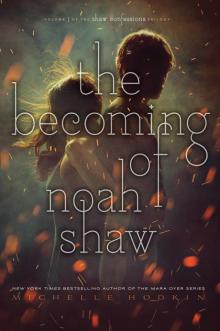 The Becoming of Noah Shaw
The Becoming of Noah Shaw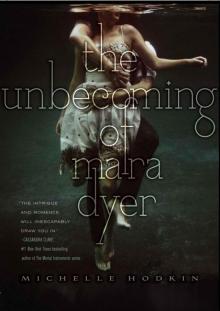 The Unbecoming of Mara Dyer
The Unbecoming of Mara Dyer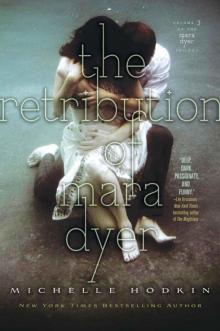 The Retribution of Mara Dyer
The Retribution of Mara Dyer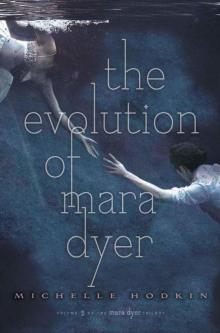 The Evolution of Mara Dyer
The Evolution of Mara Dyer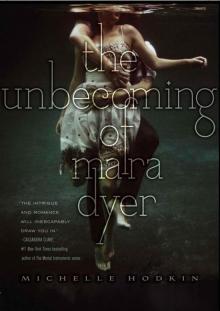 The Unbecoming of Mara Dyer md-1
The Unbecoming of Mara Dyer md-1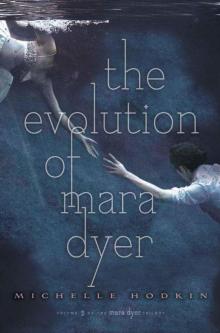 The Evolution of Mara Dyer md-2
The Evolution of Mara Dyer md-2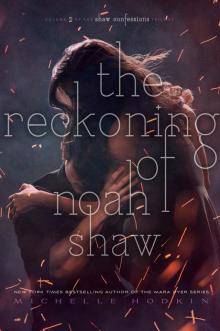 The Reckoning of Noah Shaw
The Reckoning of Noah Shaw